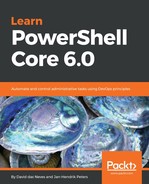LINQ provides object queries when working with .NET objects, SQL, XML, and ADO.Net datasets. It has some performance advantages for in-memory processing, as the following example nicely demonstrates:
$path = "E:Test"
$filter = "TestFile1*"
#Get-ChildItem with exclude
Measure-Command -Expression {
$files = Get-ChildItem -Path "$path*" -Filter $filter -Exclude *000* | Sort-Object -Property LastWriteTime -Descending | Select-Object -First 5
} | Select-Object -Property TotalSeconds #17 - 20 seconds
#Get-ChildItem with Where-Object filtering
Measure-Command -Expression {
$files = Get-ChildItem -Path $path -Filter $filter | Where-Object Name -NotLike *000* | Sort-Object -Property LastWriteTime -Descending | Select-Object -First 5
} | Select-Object -Property TotalSeconds # 5- 7 seconds
#.NET objects combined with LINQ
Measure-Command -Expression {
$directory = [System.IO.DirectoryInfo]::new($path)
$files = $directory.GetFiles($filter) #files contains 50k out of 150k items
[Func[System.IO.FileInfo, bool]] $delegate = { param($f) return $f.Name -notlike '*000*' }
$files = [Linq.Enumerable]::Where($files, $delegate) #49815 items left
$files = [Linq.Enumerable]::OrderByDescending($files, [Func[System.IO.FileInfo, System.DateTime]] { $args[0].LastWriteTime }) #like Sort-Object
$files = [Linq.Enumerable]::Take($files, 5) #like Select-Object -First 5
$files = [Linq.Enumerable]::ToArray($files) #convert the System.Collections.Generic.IEnumerable into an array
} | Select-Object -Property TotalSeconds # ~1 second
Complete guidance for LINQ usage with PowerShell can be found at https://www.red-gate.com/simple-talk/dotnet/net-framework/high-performance-powershell-linq/.
